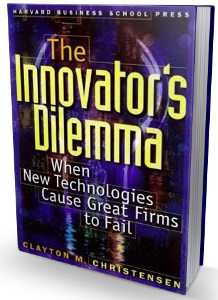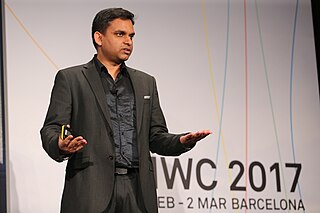
In business theory, disruptive innovation is innovation that creates a new market and value network or enters at the bottom of an existing market and eventually displaces established market-leading firms, products, and alliances. The concept was developed by the American academic Clayton Christensen and his collaborators beginning in 1995, and has been called the most influential business idea of the early 21st century. Lingfei Wu, Dashun Wang, and James A. Evans generalized this term to identify disruptive science and technological advances from more than 65 million papers, patents and software products that span the period 1954–2014. Their work was featured as the cover of the February 2019 issue of Nature and was included among the Altmetric 100 most-discussed work in 2019.

Innovation is the practical implementation of ideas that result in the introduction of new goods or services or improvement in offering goods or services. ISO TC 279 in the standard ISO 56000:2020 defines innovation as "a new or changed entity realizing or redistributing value". Others have different definitions; a common element in the definitions is a focus on newness, improvement, and spread of ideas or technologies.
A core competency is a concept in management theory introduced by C. K. Prahalad and Gary Hamel. It can be defined as "a harmonized combination of multiple resources and skills that distinguish a firm in the marketplace" and therefore are the foundation of companies' competitiveness.

Clayton Magleby Christensen was an American academic and business consultant who developed the theory of "disruptive innovation", which has been called the most influential business idea of the early 21st century. Christensen introduced "disruption" in his 1997 book The Innovator's Dilemma, and it led The Economist to term him "the most influential management thinker of his time." He served as the Kim B. Clark Professor of Business Administration at the Harvard Business School (HBS), and was also a leader and writer in the Church of Jesus Christ of Latter-day Saints. One of the founders of the Jobs to Be Done development methodology.

Harvard Business Review (HBR) is a general management magazine published by Harvard Business Publishing, a wholly owned subsidiary of Harvard University. HBR is published six times a year and is headquartered in Brighton, Massachusetts.
Product innovation is the creation and subsequent introduction of a good or service that is either new, or an improved version of previous goods or services. This is broader than the normally accepted definition of innovation that includes the invention of new products which, in this context, are still considered innovative.
Intrapreneurship is the act of behaving like an entrepreneur while working within a large organization. Intrapreneurship is known as the practice of a corporate management style that integrates risk-taking and innovation approaches, as well as the reward and motivational techniques, that are more traditionally thought of as being the province of entrepreneurship. Corporate entrepreneurship is a more general term referring to entrepreneurial actions taking place within an existing organization whereas Intrapreneurship refers to individual activities and behaviors.

Vijay Govindarajan, popularly known as VG, is the Coxe Distinguished Professor at Dartmouth College's Tuck School of Business and Marvin Bower Fellow, 2015–16 at Harvard Business School. He is a Faculty Partner in the Silicon Valley Incubator Mach49. He worked as General Electric's innovation consultant and professor in residence from 2008 to 2010. He is a New York Times and Wall Street Journal best-selling author and a two-time winner of the McKinsey Award for the best article published in Harvard Business Review. VG was inducted into the Thinkers 50 Hall of Fame in 2019 for his life-long work dedicated to the field of management, strategy, and innovation. VG received Thinkers 50 Distinguished Achievement Awards in two different categories: Breakthrough Idea Award in 2011 and Innovation Award in 2019.
Discovery-driven planning is a planning technique first introduced in a Harvard Business Review article by Rita Gunther McGrath and Ian C. MacMillan in 1995 and subsequently referenced in a number of books and articles. Its main thesis is that when one is operating in arenas with significant amounts of uncertainty, that a different approach applies than is normally used in conventional planning. In conventional planning, the correctness of a plan is generally judged by how close outcomes come to projections. In discovery-driven planning, it is assumed that plan parameters may change as new information is revealed. With conventional planning, it is considered appropriate to fund the entire project, as the expectation is that one can predict a positive outcome. In discovery-driven planning, funds are released based on the accomplishment of key milestones or checkpoints, at which point additional funding can be made available predicated on reasonable expectations for future success. Conventional project management tools, such as stage-gate models or the use of financial tools to assess innovation, have been found to be flawed in that they are not well suited for the uncertainty of innovation-oriented projects

Rita Gunther McGrath is an American strategic management scholar and professor of management at the Columbia Business School. She is known for her work on strategy, innovation, and entrepreneurship, including the development of discovery-driven planning.
The innovation butterfly is a metaphor that describes how seemingly minor perturbations to project plans in a system connecting markets, demand, product features, and a firm's capabilities can steer the project, or an entire portfolio of projects, down an irreversible path in terms of technology and market evolution.
Mark W. Johnson is co-founder and senior partner at Innosight, a growth strategy consulting firm, which he co-founded with Clayton Christensen in 2000.
Outcome-Driven Innovation (ODI) is a strategy and innovation process developed by Anthony W. Ulwick. It is built around the theory that people buy products and services to get jobs done. As people complete these jobs, they have certain measurable outcomes that they are attempting to achieve. It links a company's value creation activities to customer-defined metrics.
Innosight is a strategy consultancy within Huron Consulting Group, advising enterprises on business strategy. Innosight was founded in 2000 by Harvard Business School professor Clayton M. Christensen and senior partner Mark W. Johnson. Innosight uses methods based on the concept of disruptive innovation, a theory defined by Christensen in his book The Innovator's Dilemma. The company headquarters is located in Lexington, MA, with additional offices in Singapore and Switzerland. Scott D. Anthony is the firm's managing partner.

The Innovator's Dilemma: When New Technologies Cause Great Firms to Fail, first published in 1997, is the best-known work of the Harvard professor and businessman Clayton Christensen. It expands on the concept of disruptive technologies, a term he coined in a 1995 article "Disruptive Technologies: Catching the Wave". It describes how large incumbent companies lose market share by listening to their customers and providing what appears to be the highest-value products, but new companies that serve low-value customers with poorly developed technology can improve that technology incrementally until it is good enough to quickly take market share from established business. Christensen recommends that large companies maintain small, nimble divisions that attempt to replicate this phenomenon internally to avoid being blindsided and overtaken by startup competitors.
Scott D. Anthony is an author and senior partner at growth strategy consulting firm Innosight.

Sangeet Paul Choudary is a business executive, advisor, and best-selling author. He is best known for his work on platform economics and network effects. He is the co-author of the international best-selling book Platform Revolution: How Networked Markets Are Transforming the Economy and How to Make Them Work for You.
Advanced Innovation Design Approach (AIDA) is a holistic approach for enhancing the innovative and competitive capabilities of industrial companies. The name Advanced Innovation Design Approach (AIDA) was proposed in the research project "Innovation Process 4.0" run at the University of Applied Sciences Offenburg, Germany in co-operation with 10 German industrial companies in 2015–2019. AIDA can be considered as a pioneering mindset, an individually adaptable range of strong innovation techniques such as comprehensive front-end innovation process, advanced innovation methods, best tools and methods of the theory of inventive problem solving TRIZ, organisational measures for accelerating innovation, IT-solutions for Computer-Aided Innovation, and other tools for new product development, elaborated in the recent decade in the industry and academia.

Management System (Open Source) is a socio-technical system that leverages the cumulative knowledge of management practitioners and evidenced based research from the past 130 years. The system was developed by DoD components in partnership with industry experts and academic researchers and builds off of the US Department of Wars version 1.0 open source management system - Training Within Industry.
Efosa Ojomo is a Nigerian author, researcher and speaker. He leads the Global Prosperity research group at the Clayton Christensen Institute for Disruptive Innovation, a think tank based in Boston and Silicon Valley and is a senior research fellow at the Harvard Business School. Efosa speaks regularly on innovation and has presented his work at TED, the Aspen Ideas Festival, the World Bank, Harvard, Yale, Oxford and at several other conferences and institutions. In January 2019, Efosa and Harvard Business School professor, Clayton Christensen published "The Prosperity Paradox: How Innovation Can Lift Nations Out of Poverty".








